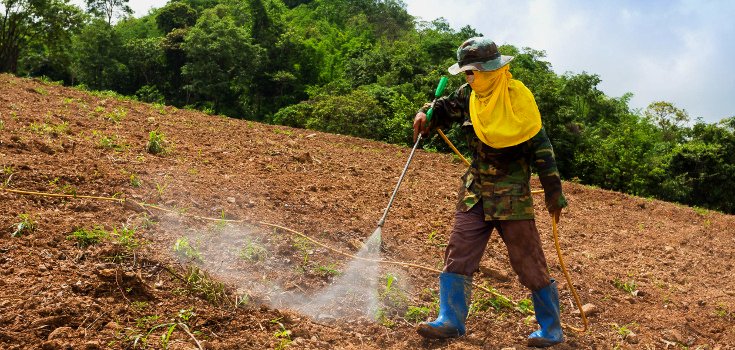Brazil’s Public Prosecutor Demands Ban on Glyphosate

A full suspension of the toxic main ingredient in Monsanto’s RoundUp, glyphosate, is being demanded by the Brazilian Federal Public Prosecutor in the Federal District. It is currently the most commonly used herbicide in Brazil, and negatively affects numerous crops, as well as human and ecosystem health.
Just one study conducted in Brazil on ‘glyphosate-resistant’ soybeans has shown some reprehensible results from utilizing Monsanto’s favorite venom. Brazil is currently the second largest producer of soybeans in the world, and sadly, they are almost entirely now GMO. More than 70% of soybeans cultivated in the country are from GE glyphosate-tolerant seed. A mere five states are responsible for 80% of Brazil’s soybean production; Rio Grande do Sul and Parana in the south, and Mato Grosso, Goîas, and Mato Grosso do Sul in the center-west region.
In addition to this request, the prosecutor would like ANVISA to revoke authorizations for any GMO crops which were created to be used with glyphosate. This means most of the crops, since biotech has based almost their entire marketing campaign on ‘Round Up Ready” seed – engineered to withstand copious amounts of glyphosate.
The prosecutor’s urgent request comes after the IARC, the cancer arm of the World Health Organization, admitted that glyphosate was ‘probably carcinogenic.’ The prosecutor is joined by thousands around the globe who seem to have been waiting for a claim such as this one by the WHO to feel confident enough to voice their own worries about glyphosate.
The public prosecutor only now seems to stand for the public, and has launched an investigation into whether regulatory authorizations for glyphosate-tolerant transgenics are even legal.
The public prosecutor has asked the CTNBio, the agency that granted the authorizations in Brazil, for copies of all regulatory documents relating to the commercial release of glyphosate-tolerant GMOs.
ANVISA is waiting on the IARC to publish a report on glyphosate before making a decision about whether or not to ban the toxic chemical. Thus far, only an executive summary has been published in the Lancet.
This seems to be a stall tactic, since there were numerous reports from credible scientists prior to the WHO’s IARC pointing to the dangers of glyphosate.
Furthermore, Brazil’s consideration of banning Monsanto’s chemical concoction is still way ahead of America’s steps to do the same. Further, while US garden and DIY stores are still selling cancer-causing poison in a jug, a German retail giant announced that it will no longer carry glyphosate-containing products as of September 30, 2015.
Brazil Made Similar Moves in 2014
In 2014, the Federal Prosecutor asked for all glyphosate herbicide use to be suspended due to questions about its chemical makeup. The Prosecutor called into question 2,4-D as well as the active ingredients methyl parathion, lactofem, phorate, carbofuran, abamectin, tiram, and paraquat.
Why?
The inactive ingredients can be just as, if not more toxic. A study published in Pesticide Biochemistry and Physiology entitled, “The effect of metabolites and impurities of glyphosate on human erythrocytes (in vitro),” explains just how RoundUp chemicals are invading our human blood.
Due to these concerns, two actions were filed by the Brazilian Prosecutor. He explains on his website:
“The first measure seeks to compel the National Health Surveillance Agency (ANVISA) to reevaluate the toxicity of eight active ingredients suspected of causing damage to human health and the environment. On another front, the agency questions the registration of pesticides containing 2,4-D herbicide, applied to combat broadleaf weed.”
The actions also requested that the Ministry of Agriculture as well as Livestock and Supply (MAPA) suspend the registration of glyphosate products until a conclusion about their safety is reached by ANVISA. The civil lawsuit contesting the registration of the herbicide also asks that the National Biosafe.
2018 Sees Another Glyphosate Ban in Brazil … and then a Reversal
In another win for environmentalists and another big loss for agrochemical company Monsanto, an August, 2018 ruling by a federal judge in Brazil suspended the use of products containing glyphosate.
Under the temporary ban, the registration of new products containing glyphosate was prohibited, and existing registrations were to be suspended for 30 days.
The suspension also applied to the insecticide abamectin and the fungicide thiram. The decision is likely to face multiple appeals.
Luiz Lourenço, director of agribusiness industry association Abag, remarked:
“I think the judge is wrong and that the decision will be revoked somehow. It is impossible to do agriculture without these products.”
Revoked it was, less than a month later.
Where are America’s actions?
